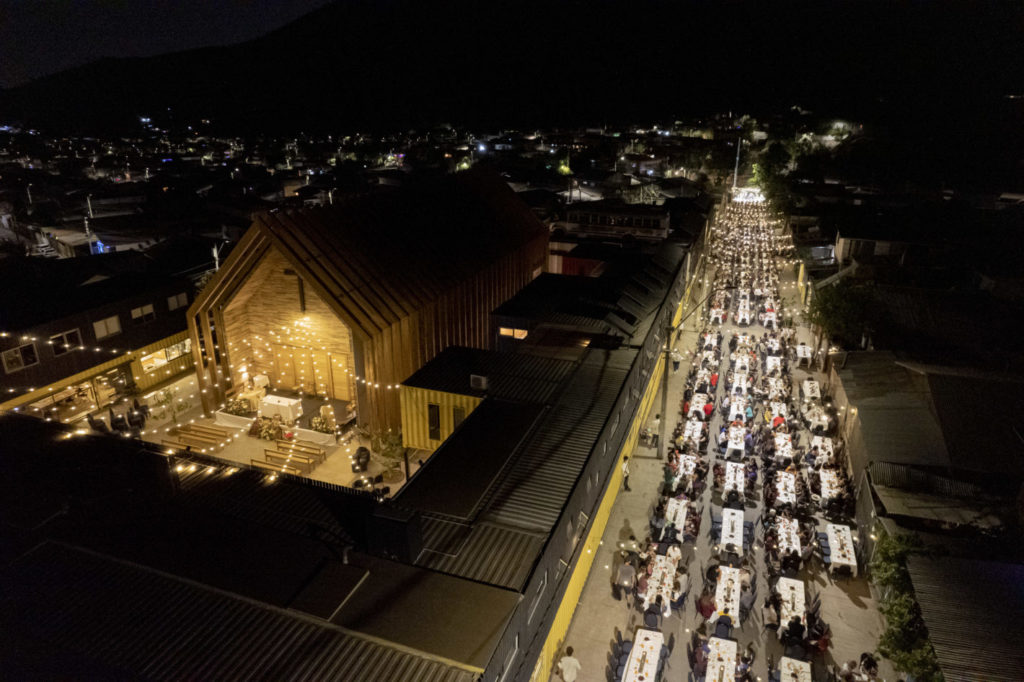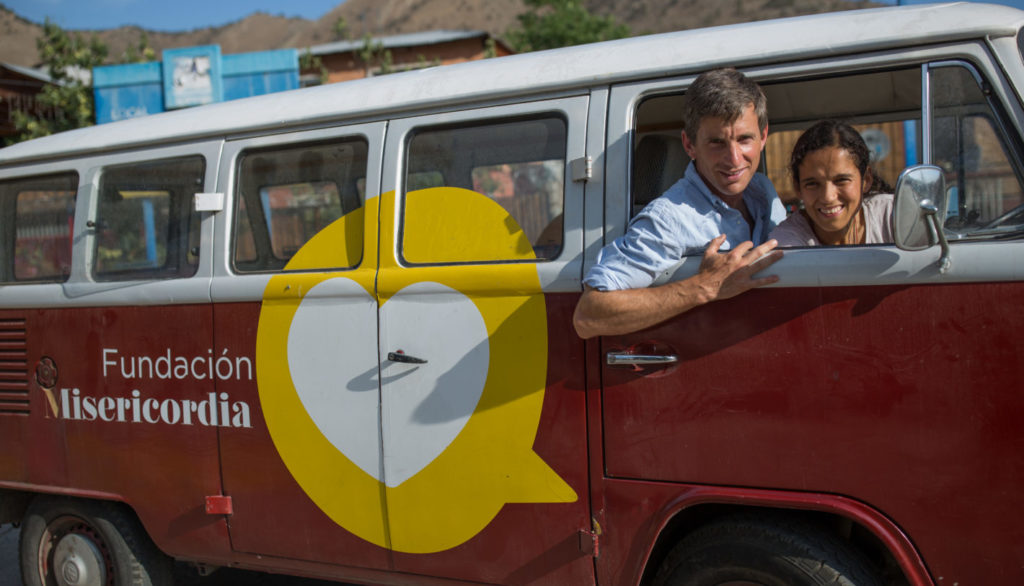Santiago de Chile is a city that can be deceptive. Upon arrival, the airport offers the welcome and quality of the most modern airports in the world. The health protocols during the covid pandemic have been recognized and praised as the most advanced. The vaccination policy has been one of the most successful globally. The fast urban highways make it possible to move in a few minutes through the different neighborhoods, including the financial center with its impressive skyscrapers. These same highways make it possible to move, in a few minutes, from one of the most elegant neighborhoods of the Chilean capital to one of the most abandoned sectors. From one reality to another very different one in a few moments. They are distant worlds that coexist in the same city. This is how we arrived at Población La Pincoya, in the north of Santiago, one of the poorest areas of the Chilean capital.


La Pincoya was born in the 1930s from occupations by workers and it seems that time stopped a few years later: wooden houses built on the slopes of the hills, precarious and almost non-existent green spaces, crime and drug trafficking are the daily bread of the inhabitants. On a hot January day, it is summer in the southern hemisphere, at the Misericordia de La Pincoya center, the French architect-missionary Romain de Chateauvieux welcomes us and tells us his story for Omnes. More than an interview, it is a conversation between a Chilean living in France and a Frenchman living in Chile... the twists and turns of life. We go from Spanish to French and from French to Spanish without realizing it, maybe when we discover the accent that each one has in the other's mother tongue. Romain is one of those people with whom you speak as if you have known each other all your life.
Romain de Chateauvieux is late for his appointment. This is something that often happens to people who dedicate their lives to solving other people's problems. They are not masters of their time, their schedules are flexible because they do not depend on them. Romain is about 40 years old, comes from an aristocratic French family, is married to Rena, Brazilian, with whom he has 5 children. In France, his name is associated with a whole generation of young social entrepreneurs such as Yann Bucaille, founder of the Cafés Joyeux (where the employees are people with disabilities), and Etienne Villemain who promoted the Association pour l'Amitié and Lazare (apartments where students or young professionals cohabit with homeless people). The waiting time gives me the opportunity to visit the Misericordia center - its chapels, classrooms, dining rooms, conservatory - and talk to some of the people who work there, in order to understand their motivations. You don't have to be a genius or come from far away to realize that more than a few buildings, what the French architect-missionary has built is an oasis. An oasis in La Pincoya.
How does a Frenchman come to settle in La Pincoya?
-God has acted in surprising ways in my life. As a student of architecture in Paris, I was traveling in South America. At that time, although I came from a Catholic family, I had abandoned the life of faith. In Brazil, accompanying a priest friend in a very poor area, I had a deep and personal conversion experience, I felt Jesus very close to me and I understood that He wanted me to serve the poor: it would be in the service of the poor that I would find the happiness I was looking for. I thought of becoming a priest, but at that time I met Rena. She is Brazilian, from a very humble social background. We became close friends and discovered our vocation to marriage and mission. That is how we traveled together by bus all over the continent, and we settled in Chile to serve the Church and the poorest of the poor 10 years ago. Our story is told in detail in our book "Misión Tepeyac".
What is it like to be a father of five, a missionary, an architect, and an entrepreneur?
-I try to unite everything in my life of prayer and relationship with God. Our children share our mission and are major players at the Misericordia center. In parallel, they lead a normal life of kids their age, they go to school, they have their friends, etc. My main occupation is to direct Misericordia internationally from Chile, we have activities in many countries and we have projects to continue growing. This activity allows me from time to time to exercise my passion for architecture, for example in the design of these buildings, classrooms, or the chapels that we build with wood brought from my French homeland. And finally, I am a missionary all day long because that is what being a Christian is all about. Concretely, in La Pincoya we are constantly visiting the families, talking to them about God and the Sacraments. Every year we have many baptisms, marriages, etc.
What is Mercy?
Misericordia International is an institution that develops social and pastoral projects in the area of health and education in the peripheries of large cities in France, the United States, Chile and Argentina. We want to open soon a center in Spain and in England. In a more profound way, the Mercy Project is born of our conviction that mercy changes the world. By making our own the two great apostolic priorities of the Church, which are service to the poor and the proclamation of the Gospel, we want to be a generous and daring response to the exhortations of Pope Francis to launch a true revolution: that of tenderness!
Something very nice in Misericordia is that we work with many Catholic institutions and people of many sensibilities within the Church. This is also evident in all the saints that we try to put as examples in the classrooms, images, books: Mother Teresa, Father de Foucauld, Sister Faustina, the Chilean saint Alberto Hurtado, etc. With time I have realized that all the saints, even if they were very different from each other, had this constant concern for the poorest. These days, for example, I have been reading a biography of St. Josemaría, who began his apostolate in the poor neighborhoods of Madrid.
On one of the walls is written the famous phrase of Pope Francis: "Mercy changes the world". Has Mercy changed La Pincoya?
-With God's grace, I think so. In this neighborhood, we are a place of welcome and formation for children and their families, for the elderly, pregnant mothers and street people. We give the children training, music, dance, literature, etc. classes. It seems to me that something important that we achieve is to keep them away from bad influences when they are no longer in classes, because they can come here to play, to learn, to grow, instead of being on the street. We take care of the sick and the elderly and clean them up. As Mother Teresa used to say, this is a drop in the ocean, we still have so much to do if we really believe that Jesus lives in the poor!
What differences do you see between your action in France and in Chile?
-First of all, there is a clear difference in the way religion is mentioned. In France, there is a very strict secularism, institutional and legal, which sometimes causes Catholics to hide a little. In Chile, this is very different. Although Church and State have been separated for almost a century, the relationship with religion is not conflictive. Here, for example, our Catholic identity is very clear: the chapels, our message, the formation we give, and this does not cause any problem to anyone as it could be the case in France.
It is also necessary to say something about poverty. I would say that it exists in both countries, but that in Chile it is more visible. We should not think that in France, because it is a more developed nation, poverty does not exist. On the contrary, it is very present but it is more hidden, it is less evident and that is part of the challenge because it has to be discovered.
Finally, with regard to our mission of evangelization, the contexts are very different. Chile is still a country very much marked by Christian culture and religion. On the other hand, our work in France takes place in an environment where Islam, anticlericalism and communism are very present. It could be said that in France we carry out a "first evangelization" so that our missionary zeal leads us, for example, to present Jesus, Way, Truth and Life, to Muslims or other people who have never heard of Him.
For years, Chile has been undergoing a very strong political and social transformation. How do you see the current situation in the country?
-As in the rest of the Western world, Chilean society has been secularizing little by little and this is a great challenge for Catholics in this country. The crisis in the Chilean Church has also been very strong and this has caused that a very respected institution has been losing its prestige and importance as a social actor. At the same time, for several years now, many immigrants, mainly Venezuelans, have been arriving in Chile. As we know, these migratory phenomena are not easy to channel, but I think that from the spiritual point of view, many of these people who arrive, who are very poor, have the great richness of faith and a sense of family: they can contribute a lot to Chile. Finally, the world has also witnessed the political crisis, the constitutional process and the last presidential elections. I sincerely think that we all have to be more supportive, to think about how to make this model of society more fraternal and humane. In particular, we Catholics have to do our bit in this process of reconciliation.
Do you see your future in Chile? What other projects do you have?
-We are doing very well in Chile, but our vocation as missionaries pushes us constantly to look for new challenges, to be always on the move, to not stay in our comfort zone. What I like are the beginnings of a project because I believe that I have the spirit of a pioneer, of an entrepreneur. In La Pincoya, I have probably reached a certain point of comfort: I already have my routine, I know everyone, I speak the language, etc. I am ready for whatever God wants and I am ready to do what God wants. I am ready for whatever God wants and maybe at some point He will ask me to leave this beautiful land that is Chile.













